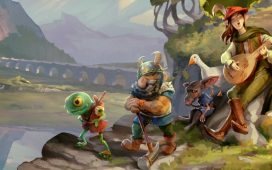It’s dangerous to go alone. Take this. It’s an all-Rush mixtape. I just made it myself. Sorry the handwriting is a bit smudged. Who needs a tracklisting anyway? It’s an all-Rush mixtape. A sweet C90! Crank it, and let it bounce off the peeling surfaces of your dorm room until there are thumps on the ceiling and angry notes pushed under the door.
And take this. It’s a mechanical keyboard. The perfect clicky, clacky, percussive companion to the adventure you are about to begin. And take this. Some slightly scratched Wayfarers I found in a cubby hole near the science block. All the better for dimming the horrors that lie ahead. Who cares that it’s midnight? You’ve seriously never worn Wayfarers at midnight before? And take this. It’s a six-pack of A&W root beer, warmed by the idling engine of a 1968 Ford Galaxie, and from back before A&W messed with the formula and the last notes switched from arctic Wintergreen to cloying caramel. And take this. Pop-Tarts. Frosted Strawberry. The all-Rush mixtape of the microwave.
Wrong game, but it doesn’t matter. Back near the start of console gaming there was a warning issued that it was dangerous to go alone. Back on PCs – before PCs, on mainframes, and shared terminals and PDPs and all that jazz – there was, what? An invitation. “Welcome to the Dungeons of Doom.”
Rogue has arrived on Steam – the original Rogue, more or less. The Rogue that all roguelikes are like. The Rogue that all roguelites are litely like. And it is initially an overwhelmingly nostalgic thing. Pull back the coffin lid. Yes, that’s Wintergreen wafting out. No caramel! Just the thin medicinal flavour of late-night sessions in the computer lab. And look at the screen! That’s the grainy void of the DOS days, when computers had dark backgrounds like this and word-processors picked out their tabulation strips in neat constellations of stars. Computers were mysterious back then. They were, well, a bit like Rogue. You moved from one dark area to another lead by bright points of light. You had to know the arcane commands to earn your progress. Speak friend and press enter.
I had encountered Rogue before. Not back in the day, of course. By the time I hit university, which is the perfect place to encounter Rogue, there were Macs lined up in the computer rooms with graphical interfaces and lots of colour, even if they did render Jpegs and Bitmaps in weird solar-flare flashes that left your skin feeling faintly torched. No. I encountered Rogue a few years ago when I suddenly realised I should know what the roguelikes I was playing were actually like. I was new to roguelikes back then, which mean that I was beholden to the precise mechanical elements of each new example, unable yet to do that Magic-Eye thing with your mind that you get to do when you really know a genre – where you sort of cross your inner eyes and the details blur out while the soul of the game, the actual feeling, the texture that all these careful design decisions pick out in contour, slowly becomes apparent and starts to glow. So reduced to mechanical elements, Rogue was kind of pernickety. I remember feeling very strongly the way that enemies, the whole world, only moved when you did. That sort of hopscotching of progress. It felt stilted and archaic, an old dance that I was constantly falling out of step with. I wandered around, endured staccato combat with the odd bat – how quaint, this letter B is a bat! – and then I drank a potion that killed me and I logged off. I did not like the Rogue that all roguelikes were like.
For some reason, this time it’s different. I appreciate I sound like someone who missed the US election because I don’t even have a TV man. But anyway, I know I sound like that and yet – in the week that the new consoles suddenly really feel like they’re here, I discover that I am unwittingly snubbing all that because Rogue is here too and I am in love with it. I have fallen into it. I am swamped in the very best sense. It really was dangerous to go alone. (Wrong game.)
What changed? Rogue is a game about exploring. You are a little smiley face walking through a set of rooms in which the letters of the alphabet can kill you. Bs are bats. Ks are kestrels. Is are – oh Christ, Is are Ice Monsters. I think. I didn’t really have time to take notes when they were upon me.
You wander around, room to grey cross-hatched corridor to room, the rooms picked out in brown in an oddly fancy, chintzy touch, like they’re made from Louis XV furniture or something, like the Dungeons of Doom might be the drawers and secret compartments of an escritoire left to you by a forgotten great aunt. Sometimes you see something good – a bright yellow shape that I love, all pointy angles and medieval star charts. A galaxy. A poised comet of gold. How many gold pieces? No matter. Throw them in the purse. Sometimes you see something bad. A trap! What’s the button to learn more about that? Eek. And sometimes you see something that might be good or bad. A potion. I know the colour but not what it does. Dare I?
Let’s go back a second. There is something to the furniture analogy. Rogue is a wonderfully private game, wonderfully compact. There is a touch of those old pieces of furniture that you couldn’t just close but could also then lock with a small key. Roguelikes love keys and locks, but Rogue is also a place that will allow you to look at your secrets, your slowly-accrued treasure, and keep them safe and private. At times it feels like playing a pen-and-paper RPG, a friend drawing the map and throwing bats at you as you make your decisions. But more often, it really does feel like furniture. Maybe someone else’s furniture. Questionable provenance. What’s in this drawer, and this one? Why does this panel feel like it might move? Why does this side feel hollow? (Wrong game, but wasn’t Zelda inspired by Miyamoto’s desk drawers, each containing an imagined garden?)
And the ASCII stuff – the letters and shapes. Press F1 and Rogue reveals an awful lot of its secrets. How to move and how to save, how to see what items you have. It is all wonderfully elbowy. Q will quit. But q? q will allow you to quaff a potion! Quaff! Literally the only person I have ever heard use the word quaff was Snoopy. (He was talking about root beer.)
I love this doubling up. And I love that the whole keyboard is your controller. It feels both very old – back to the days when you advanced text in adventure games by pressing full-stop – and kind of new? Like the keyboard is a weirdly over-the-top custom controller made in Hoxton, a tool used only for playing this most special of special games.
The mystery of it! You go into a room and there’s an E waiting. Suddenly I realise I have very strong feelings about the letter E – I don’t trust it at all. And I’m right not to. It’s a bloody Emu. And now it’s a Bloody Emu because it’s taken a chunk out of me. Everything in Rogue is like this, the possibility for something good or something bad. And then onward. And those letters do so much! A K will stay still until I get close – it really is like a bird whose roost has been disturbed. I picture the bird, but I also keep a ghost of the fact that I am just fighting a huge K. They both interlink in the mind. It works. It’s distinct. It has a very strange kind of charisma. Limitations have once again made something very special.
It clicked for me when I found a green block with three lines on it. Oh shit. What fresh hell is this? I circled it for a while, alone in the chintzy room with this green newcomer. I suspected – those three lines looked like a baker’s scores – that it might be toxic bread. I pressed F1 and looked at my possible options. Nothing.
Eventually I understood: stairs. This toxic bread was actually stairs, and it was telling me that I had reached the point in Rogue where I had cleared an entire floor. Time to go down. Because like Spelunky, like Noita, like a hundred other games inspired by it, Rogue has that claustrophobic progression system of going down, getting deeper, and then finding the ultimate treasure and – oh god – having to come back up again.
I don’t know why it’s clicked for me so much. I am drawn into this game. I cannot get enough of it. I have other work to do but I keep coming back to Rogue. It’s exciting to play, but the act of playing, viewed somehow from the outside as well as the inside, is also exciting. It’s exciting that I can take this odd screen and make sense of it all. And in the midst of it, I wonder who the rogue in question is. It’s me? And yet I don’t feel like a rogue – I feel hesitant and honestly excited. Maybe the game is the rogue? Tricksy and filled with decadent malice. A posh monster who could kill you with a cup and saucer if they absolutely had to.
And all this time, I’m not just examining Rogue as a curio from the past. I’m not studying it as the point at which all these other games I love began. I am playing it, whole-heartedly playing it – constantly delighted and surprised and killed at the worst moment or poisoned or brought back from the brink. Those ASCII landscapes conjure the best kinds of idioms and cliches. Narrow escape! Horrible beasts! When you least expect it! Dungeons, if you will, of doom.
There is more to it, I suspect. In a way I am realising that Rogue, right, is a bit like roguelikes? I enter a dungeon and immediately find the stairs down to the next floor. I should go, shouldn’t I? But also, this floor is meant in part to level me up? Or to kill me? In a roguelike everything is a resource, everything is a gamble. But you have to choose. You have to commit. All of that was back here at the start. No wonder I never notice the staccato world-that-only-moves-when-you-do machine stuff anymore. Rogue is not on rails. It’s not even the exquisite gears and tension-stores of a watch. It uses your energy: it moves at the pace of your thought.
And more. To go back to the source like this is to realise that the source leads back further still. The people who made Rogue weren’t making a Roguelike, just like the people who made Diablo weren’t making an action RPG. They were trying to capture something of the games that they loved that played out in basements and dorms and did not always have maps or pieces, but always had vibrant moments that came to life so sharply, so brightly, that everyone playing probably felt that they were seeing the exact same imaginary thing as the person sitting next to them. Except now you can play it by yourself, up late, everyone else asleep and the campus briefly quiet. Wrong game, I know. But it really is dangerous to go alone. So take this.













